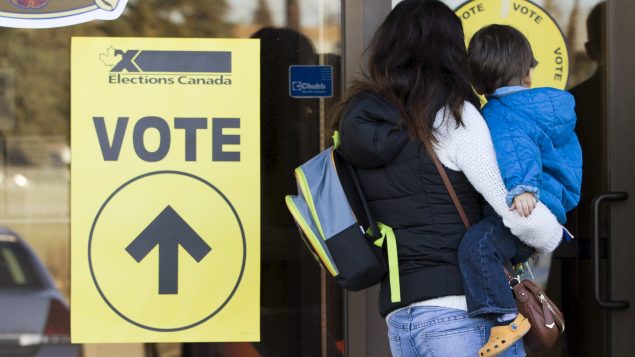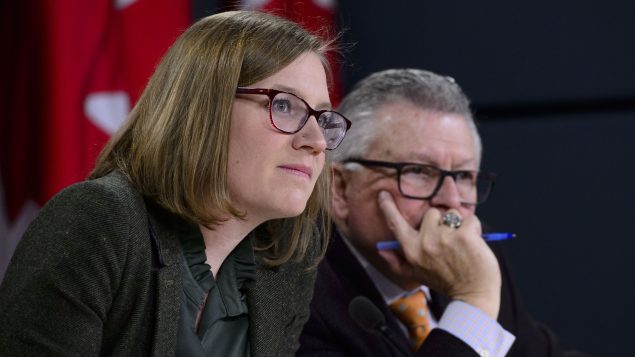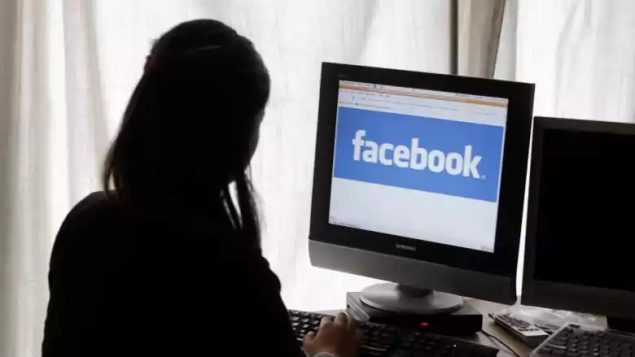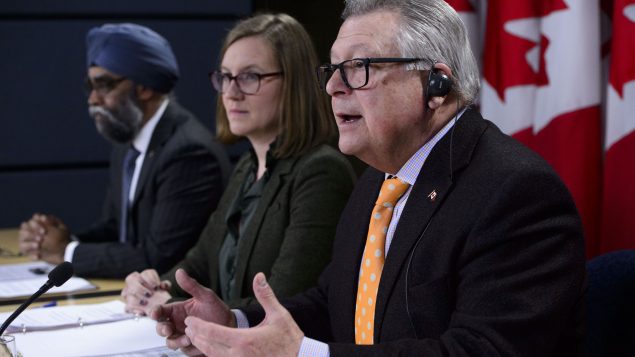With nine month to go until Canadians head to polls to elect the next federal government, Ottawa unveiled a series of new measures aimed at further beefing up Canada’s electoral system against foreign interference, and enhancing its ability to defend the democratic process from cyber threats and disinformation.
The new measures unveiled Wednesday in Ottawa by Minister of Democratic Institutions Karina Gould, Public Safety Minister Ralph Goodale and Defence Minister Harjit Sajjan will focus on four areas.
These include taking proactive measures to combat foreign interference, enhancing citizen preparedness, improving coordination between Canada’s security agencies and calling on social media platforms to take “actions to increase transparency, authenticity and integrity on their systems.”
A new panel and a task force

A woman holding a baby enters a polling station to vote in Calgary, Alberta, October 19, 2015. The federal government setting up a five-person panel of senior bureaucrats to sound the alarm when a serious attempt to meddle in the election by a foreign actor that could threaten the integrity of the electoral process has taken place. (Mark Blinch/REUTERS)
Ottawa is also setting up a five-person panel of senior bureaucrats to sound the alarm when a serious attempt to meddle in the election by a foreign actor that could threaten the integrity of the electoral process has taken place.
The panel will consist of the Clerk of the Privy Council, the federal national security and intelligence adviser, the deputy minister of justice, the deputy minister of public safety and the deputy minister of Global Affairs Canada (GAC).
The government is also setting up a new task force composed of members of Canada’s security and intelligence agencies — the Canadian Security Intelligence Service (CSIS), the Royal Canadian Mounted Police (RCMP) and the Communications Security Establishment (CSE), along with GAC — to try to prevent clandestine forces from influencing the electoral process.
The Security and Intelligence Threats to Elections (SITE) Task Force, chaired by the CSE, Canada’s signal intelligence agency, will work to identify foreign threats to Canada’s electoral process and help the government respond, Goodale said.
(click to listen to Public Safety Minister Ralph Goodale’s remarks)
Listen“Whether it’s hacking, intimidation, bribery or whatever, they have the tools and the skills to identify the interference and its source,” Goodale said.
Role for political parties, news and social media outlets
Political parties in Canada bear a particular responsibility for securing their own IT infrastructure against unlawful access by foreign and domestic actors, Goodale said.
To help them in that task, the federal government will provide security briefings to key members of national political parties with appropriate security clearance to warn them of any threats, Goodale said.
The news media also have a key role to play in safeguarding the integrity of Canada’s democratic process, he said.
“Never has journalism been under such pressure from those who would masquerade as legitimate but whose strings are pulled by foreign authorities as they use cyberspace to manipulate,” Goodale said.
Finally, social media giants such as Twitter and Facebook have a very important role to play in ensuring “that they are contributing to and not detracting from political discourse,” Goodale said.
“Individually and through the Five Eyes and the G7 we have challenged the social media operators to help us combat such evils as terrorist propaganda, the sexual exploitation of children and human trafficking,” Goodale said. “More and more insidious foreign interference to subvert democracy is being added to the list of harms that these service providers need to help stop.”

Minister of Democratic Institutions, Karina Gould, along with the Minister of Public Safety and Emergency Preparedness, Ralph Goodale, make an announcement regarding safeguards to Canada’s democracy and combatting foreign interference during a press conference in Ottawa on Wednesday, Jan. 30, 2019. (Sean Kilpatrick/THE CANADIAN PRESS)
While Canada’s electoral system uses paper ballots, making it more resilient , Gould said Canadian officials are concerned about the risk online manipulation on social media platforms poses to the integrity of the upcoming election.
“We expect social media platforms to take concrete actions to help safeguard this fall’s election by promoting transparency, authenticity and integrity on their platforms,” Gould said.
The Canadian government expects social media companies to implement the same measures they undertook to during the elections in the U.S., France and Germany, she said.
However, Gould would not say what the federal government would do if social media companies refused to play ball with Ottawa.
Diplomacy is OK, covert interference is not
From time immemorial governments worldwide have been engaged in efforts to mould public opinion and government policies in other countries to advance their own interests, said Goodale.
“As long as that is done in an open, peaceful, transparent manner within the law, it’s fine,” Goodale said. “It’s called diplomacy or treaty negotiations.”
Ottawa’s “Team Canada” efforts to shape opinions and build support in the United States for the North American Free Trade Agreement (NAFTA) are a good example of such a case, Goodale said.
“All very public, factual, lawful, no basis for any objection,” he said. “But when that kind of activity becomes covert or clandestine, when it consists of lies and disinformation aimed at misleading people, destabilizing the economy or society, or manipulating the democratic process a bright red line gets crossed.”
Foreign interference in Canadian elections can take many forms, Goodale said.
“It could be the old-fashioned way: hostile intelligence services collecting or stealing political, economic, commercial or military information,” Goodale said. “Or it could be foreign agents providing illegal funds to support candidates or bribe officials. Or it could be cultivating personal and financial ties to coerce or manipulate Diaspora.”
Bots, trolls and fake news

Canadian officials are concerned about the risk online manipulation on social media platforms poses to the integrity of the upcoming election, said Minister of Democratic Institutions Karina Gould.
(Paul Sakuma/AP)
However, increasingly foreign interference is higher tech, Goodale said.
“Social media have been used to falsely slander elected officials, trolls and bots are dispatched to stoke anxiety, even hysteria around sensitive issues, fake news masquerades as legitimate information,” Goodale said. “As we’ve seen these issues are of deep concern among G7 and Five Eyes partners.”
One study estimates that nearly one-fifth of tweets during the final month of the 2016 U.S. election were generated by bots, automated software designed to look like a real social media user but which in fact is used to influence social media users, Goodale said.
“So this wasn’t citizens intensely engaged in the democratic process, instead it was contrived and electronically generated meddling intended to pervert the conversation,” Goodale said.
In France botnets were used to promote false and defamatory propaganda against the leading candidate Emmanuel Macron, in Germany in the 2017 parliamentary elections seven of the 10 most shared articles about Chancellor Angela Merkel posted on Facebook were false, Goodale said.
“There is no doubt that covert and corrupt activities originating in foreign capitals are taking place,” Goodale said. “They are intended to corrode systems and institutions, and pervert the course of democracy.”
Gould said it would “naïve” to think that Canada would be spared such hostile activities.
“We are a member of the G7, of NATO, of the Five Eyes, it would be naïve of us to assume that we are not a target for a cyberattack,” Gould said.







For reasons beyond our control, and for an undetermined period of time, our comment section is now closed. However, our social networks remain open to your contributions.